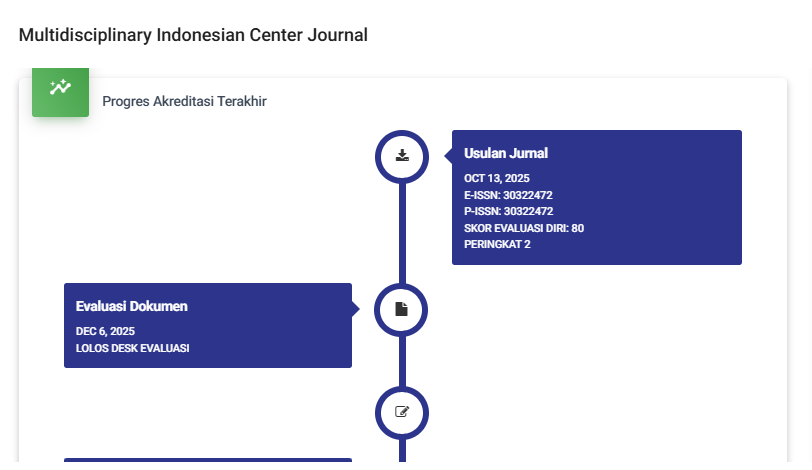ANALYSIS OF ETHICS OF GOVERNMENT APPARATUS BEHAVIOR IN PUBLIC SERVICE BASED ON LAW NUMBER 25 OF 2009 IN TAMALATE DISTRICT
DOI:
https://doi.org/10.62567/micjo.v2i4.1449Keywords:
Work Behavior Ethics, Public Services, Government EmployeesAbstract
This study aims to implement the work ethics of government employees in providing public services in Tamalate District based on Law Number 25 of 2009 concerning Public Services. This study uses a qualitative method with a case study approach in administrative services in Tamalate District. Data were collected through in-depth interviews with government employees and service users, direct observation of the service process, and analysis of relevant documents. The results of the study indicate that the work ethics of government employees in providing public services is still not optimal. Some employees exhibit unprofessional behavior, such as slow service delivery, lack of empathy towards the public, and low transparency in the service process. However, there are also employees who demonstrate positive behavior, such as providing clear and accurate information, and praying friendly and patient in serving the public. This study concludes that improving the work ethics of government employees is essential through public service ethics training programs, strict supervision, and regular evaluation and monitoring of employee performance. This effort is crucial to ensure public services meet the standards of professionalism, transparency, and accountability as mandated by Law Number 25 of 2009. The results of this study are expected to contribute to improving the quality of public services in Tamalate District and serve as a reference for similar research in the future.
Downloads
References
Bovens, M. (2010). Two concepts of accountability: Accountability as a virtue and as a mechanism. Western European Politics, 33(5), 946–967.
Bowman, J. S., & West, J. P. (2018). Public service ethics: Individual and institutional responsibilities (3rd ed.). Routledge.
Cooper, T. L. (2012). The responsible administrator: An approach to ethics for the administrative role (6th ed.). Jossey-Bass.
Dwiyanto, A. (2006). Public bureaucratic reform in Indonesia. Yogyakarta: Gadjah Mada University Press.
Denhardt, J. V., & Denhardt, R. B. (2015). The new public service: Serving, not steering (4th ed.). Routledge.
Fadhallah. (2020). Qualitative Research Methods: Theory and Application. Jakarta: Prenadamedia Group.
Keban, Y. T. (2019). The six strategic dimensions of public administration: Concepts, theories, and issues. Gava Media.
Kurniawan, D. (2021). The Influence of Public Service Motivation on the Ethical Behavior of Local Government Employees. Journal of Indonesian Public Administration, 8(2), 122–135.
Moleong, L. J. (2021). Qualitative Research Methodology. Bandung: PT Remaja Rosdakarya.Ni'matuzahroh, & Prasetyaningrum, J. (2018). Psychology and Education Research Methods. Malang: UMM Press.
Perry, J. L., & Wise, L. R. (1990). The motivational bases of public service. Public Administration Review, 50(3), 367–373.
Rahmawati, S., & Fathoni, A. (2020). The influence of employee professionalism on community satisfaction in public services at the District Office. Scientific Journal of Public Administration, 6(1), 55–67.
Ramdhani, A., & Gani, A. (2021). Bureaucratic ethics and good governance: An analysis of the ethical behavior of state civil servants. Journal of Government and Socio-Political Sciences, 9(2), 210–225.
Rokhman, B., Kurniasih, D., & Tobirin, T. (2023). Implementation of public administration ethics in achieving good governance in Indonesia. Co-Value Journal of Cooperative Economics and Entrepreneurship, 14(7), 915-924. https://doi.org/10.36982/jpg.v9i3.3757
Robbins, S. P., & Judge, T. A. (2013). Organizational Behavior (15th ed.). Pearson.
Sari, D. P. (2020). The influence of the work ethics of the apparatus on public trust in administrative services. Journal of Public Service, 4(1), 45–58.
Satibi, Iwan & Ediyanto, E. (2020). Ethics and bureaucratic behavior in supporting the strengthening of good governance. Journal of Academia Praja, 3(2), 234-250 https://doi.org/10.51577/jgpi.v2i1.318
Serendipity. (2018). Human resource management: Bureaucratic reform and civil servant management. Aditama Review.
Subagyo, J. (2017). Research Methods in Theory and Practice. Jakarta: Rineka Cipta.Sugiyono. (2016). Quantitative, Qualitative, and R&D Research Methods. Bandung: Alfabeta.
Sugiyono. (2019). Qualitative, Quantitative, and R&D Research Methods. Bandung: Alfabeta.
Thoha, M. (2017). Bureaucracy and politics in Indonesia. RajaGrafindo Persada.
Wiranata, I. G. (2005). Ethics of government and public service. Udayana University Press.
Downloads
Published
How to Cite
Issue
Section
License
Copyright (c) 2025 Nur Azizah Anwar, Eka Fitra Ramadani, Inayatul Mutmainnah

This work is licensed under a Creative Commons Attribution-ShareAlike 4.0 International License.



























